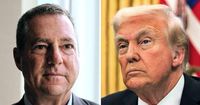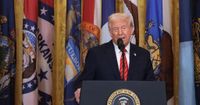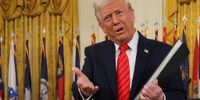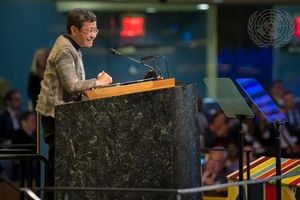President Donald Trump announced on Thursday, March 20, 2025, that he would rescind an executive order threatening the security clearances of law firm Paul Weiss, following a meeting with the firm's chairman, Brad Karp. This decision is a pivotal moment in Trump's ongoing campaign against law firms that do not align with his political agenda.
The rescinded order, initially issued on March 14, effectively barred attorneys from Paul Weiss from federal contracts, citing the firm’s connections to former partner Mark Pomerantz, who previously investigated Trump's financial dealings while working for the Manhattan District Attorney’s office.
In a statement shared on Trump's Truth Social account, Karp expressed gratitude for the President's decision, saying, "We are gratified that the President has agreed to withdraw the executive order concerning Paul, Weiss. We look forward to an engaged and constructive relationship with the President and his administration.” As part of the agreement, Paul Weiss also pledged to provide $40 million worth of pro bono legal services in support of initiatives favored by the Trump administration.
Moreover, the firm committed to eliminating diversity, equity, and inclusion (DEI) considerations from its hiring practices. This move is indicative of Trump’s broader strategy against such policies, which he claims are discriminatory. Companies like Walmart, Meta, and Lowe's have already scaled back their DEI programs in response to similar pressures.
The reinstatement of Paul Weiss's federal contracts is part of a larger pattern of concessions being made by corporations that find themselves under scrutiny by Trump. “We look forward to a constructive relationship, as we take on a wide range of pro bono matters that represent the full spectrum of political viewpoints of our society,” Karp stated.
However, the implications of such agreements cannot be understated. Legal experts are concerned that Trump's executive orders are creating a chilling effect in the legal profession, where firms might hesitate to take on clients with positions contrary to the administration's views. This sentiment follows the restraints and threats aimed at law firms such as Covington & Burling and Perkins Coie, which are also under fire from the Trump administration.
The recent actions by the Equal Employment Opportunity Commission have fanned the flames of this controversy, suggesting that common DEI initiatives might run afoul of federal antidiscrimination laws.
“The President is agreeing to this action in light of a meeting with Paul Weiss Chairman, Brad Karp, during which Mr. Karp acknowledged the wrongdoing of former Paul Weiss partner, Mark Pomerantz,” the White House noted, further complicating the narrative surrounding the legality and morality of the concessions being made. Pomerantz had previously attempted to build a case against Trump, prompting claims of bias from the U.S. President.
Amidst these negotiations, Mark Pomerantz vehemently denied any wrongdoing, asserting, “I engaged in no wrongdoing by working as a prosecutor to uphold the rule of law.” His status as a former partner of Paul Weiss, coupled with the firm’s recent pivot towards pro-Trump policies, raises questions about the direction of the legal profession under this administration.
The deal to rescind the executive order specifically targets Paul Weiss while the fate of other firms remains uncertain. The broader effects of Trump's executive orders, particularly on Perkins Coie and Covington & Burling, underscore a potential for ongoing conflicts between political ideology and legal representation.
This agreement highlights the complex relationship between corporate America and the Trump administration, as firms navigate the pressures to align with politically motivated agendas. Following his past actions, Trump has demonstrated a willingness to hold corporations accountable for their political affiliations.
Ultimately, this scenario illustrates the precarious position in which law firms find themselves—caught between their legal obligations and the potential fallout from political retribution. With Trump actively seeking to influence corporate policies, the future will likely witness continued tensions as firms reassess their strategies in the face of political pressures.
The President's dealings with Paul Weiss might be a case study of how political affiliations can shape legal landscapes, potentially leading to a reshaping of client representation and the ethical obligations of legal professionals.
As this situation continues to unfold, legal observers are closely monitoring the implications for both the legal community and firms that may feel inclined to change their strategies in response to the shifting political tides.






